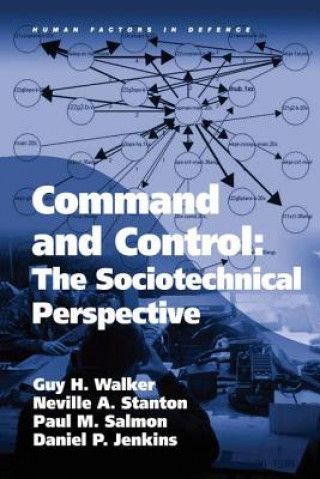
Kód: 04681449
Command and Control: The Sociotechnical Perspective
Autor Paul M. Salmon, Neville A. Stanton, Guy H. Walker, Daniel P. Jenkins
Military command and control is not merely evolving, it is co-evolving. Technology is creating new opportunities for different types of command and control, and new types of command and control are creating new aspirations for tec ... celý popis
- Jazyk:
 Angličtina
Angličtina - Vazba: Pevná
- Počet stran: 216
Nakladatelství: Taylor & Francis Ltd, 2009
- Více informací o knize

Mohlo by se vám také líbit
-

CBT: The Cognitive Behavioural Tsunami
1277 Kč -

Towards climate-responsible peatlands management
1080 Kč -

Christ is in Our Midst
343 Kč -

Reading and Rhyme Ages 3-5
144 Kč -

Five-Minute Peppa Stories (Peppa Pig)
352 Kč -

Babylon's Ashes
610 Kč -

Illustrated Herbiary: Guidance and Rituals from 36 Bewitching Botanicals
441 Kč
Dárkový poukaz: Radost zaručena
- Darujte poukaz v libovolné hodnotě a my se postaráme o zbytek.
- Poukaz se vztahuje na celou naši nabídku.
- Elektronický poukaz vytisknete z e-mailu a můžete ihned darovat.
- Platnost poukazu je 12 měsíců od data vystavení.
Více informací o knize Command and Control: The Sociotechnical Perspective
Nákupem získáte 608 bodů
 Anotace knihy
Anotace knihy
Military command and control is not merely evolving, it is co-evolving. Technology is creating new opportunities for different types of command and control, and new types of command and control are creating new aspirations for technology. The question is how to manage this process, how to achieve a jointly optimised blend of socio and technical and create the kind of agility and self-synchronization that modern forms of command and control promise. The answer put forward in this book is to re-visit sociotechnical systems theory. In doing so, the problems of 21st century command and control can be approached from an alternative, multi-disciplinary and above all human-centred perspective. Human factors (HF) is also co-evolving. The traditional conception of the field is to serve as a conduit for knowledge between engineering and psychology yet 21st century command and control presents an altogether different challenge. Viewing military command and control through the lens of sociotechnical theory forces us to confront difficult questions about the non-linear nature of people and technology: technology is changing, from platform centric to network centric; the interaction with that technology is changing, from prescribed to exploratory; and complexity is increasing, from behaviour that is linear to that which is emergent. The various chapters look at this transition and draw out ways in which sociotechnical systems theory can help to understand it. The sociotechnical perspective reveals itself as part of a conceptual toolkit through which military command and control can be transitioned, from notions of bureaucratic, hierarchical ways of operating to the devolved, agile, self-synchronising behaviour promised by modern forms of command and control like Network Enabled Capability (NEC). Sociotechnical system theory brings with it a sixty year legacy of practical application and this real-world grounding in business process re-engineering underlies the entire book. An attempt has been made to bring a set of sometimes abstract (but no less useful) principles down to the level of easy examples, design principles, evaluation criteria and actionable models. All of these are based on an extensive review of the current state of the art, new sociotechnical/NEC studies conducted by the authors, and insights derived from field studies of real-life command and control. Time and again, what emerges is a realisation that the most agile, self-synchronising component of all in command and control settings is the human.
 Parametry knihy
Parametry knihy
Zařazení knihy Knihy v angličtině Society & social sciences Warfare & defence Military life & institutions
6077 Kč
- Plný název: Command and Control: The Sociotechnical Perspective
- Autor: Paul M. Salmon, Neville A. Stanton, Guy H. Walker, Daniel P. Jenkins
- Jazyk:
 Angličtina
Angličtina - Vazba: Pevná
- Počet stran: 216
- EAN: 9780754672654
- ISBN: 0754672654
- ID: 04681449
- Nakladatelství: Taylor & Francis Ltd
- Hmotnost: 538 g
- Rozměry: 236 × 161 × 19 mm
- Datum vydání: 28. November 2009
Oblíbené z jiného soudku
-

Uniforms of the Waffen-SS: Vol 3: Armored Personnel - Camouflage - Concentration Camp Personnel - SD - SS Female Auxiliaries
1945 Kč -

Mamluks 1250-1517
441 Kč -

Illustrated Encyclopedia of the Uniforms of the Roman World: A Detailed Study of the Armies of Rome and Their Enemies, Including the Etruscans, Sam
543 Kč -

Band Of Brothers
276 Kč -

Illustrated Encyclopedia of Uniforms of the Napoleonic Wars
543 Kč -

Illustrated Encyclopedia of Uniforms of World War II
543 Kč -

Illustrated Encyclopedia of Military Uniforms of the 19th Century
543 Kč -

Insignia of the Waffen-SS: Cuff Titles, Collar Tabs, Shoulder Boards and Badges
511 Kč -

Russian Civil War (2)
473 Kč -

French Army 1940
559 Kč -

Waffen-SS Camouflage Uniforms, Vol. 2
2484 Kč -

Night Hawks and Black Widows: 13th Air Force Night Fighters in the South and Southwest Pacific, 1943-1945
1564 Kč -

EM6 Waffen-SS Uniforms in Colour Photographs
484 Kč -

Camouflage Uniforms of the Waffen-SS : A Photographic Reference
1944 Kč -

Waffen-SS Camouflage Uniforms, Vol. 1
2062 Kč -

Tiger Patterns: A Guide to the Vietnam Wars Tigerstripe Combat Fatigue Patterns and Uniforms
1563 Kč -

German Paratr in North Africa
2219 Kč -

Roman Military Dress
839 Kč -

Camouflage Uniforms of the German Wehrmacht: Manufacturers - Zeltbahnen - Headgear - Fallschirmjager Smocks - Army Smocks - Padded Uniforms - Leibermu
1781 Kč -

Imperial German Field Uniforms and Equipment 1907-1918: Vol I: Field Equipment, tical Instruments, Body Armor, Mine and Chemical Warfare, Communicat
1563 Kč -

How to Read European Armor
624 Kč -

Personnel Armor System Ground Tr (PASGT) Helmet: An Illustrated Study of the U.S. Militarys Current Issue Helmet
472 Kč -

We Who Are Alive and Remain
543 Kč -

1st Airborne
356 Kč -

Norwegian Waffen-SS Legion, 1941-43
374 Kč -

Complete Roman Legions
543 Kč -

Black and Field Gray Uniforms of Himmler's SS Vol. 2
2442 Kč -

Black and Field Gray Uniforms of Himmler's SS Vol. 1: Black Service Uniforms
2723 Kč -

Sea Stories
582 Kč -

German Helmets of the Second World War: Vol One: M1916/18, M1932, M1935, M1940, M1942, M1942/45
2467 Kč -

M-1 Helmet: A History of the U.S. M-1 Helmet in World War II
1259 Kč -

Dragoons
606 Kč -

Pt-World War II M-1 Helmets: An Illustrated Study
1028 Kč -

French Dragoons
605 Kč -

Waffen-SS
408 Kč -

Australian Army at War 1976-2016
374 Kč -

Battle Colors Vol 3: Insignia and Tactical Markings of the Ninth Air Force in World War Ii
1276 Kč -

Collector's Guide to Cloth Third Reich Military Headgear
1781 Kč -

Uniforms of the German Colonial Tr 1884-1918
1564 Kč -

British Campaign Medals, 1914-2005
218 Kč -

French Army of the Orient 1798-1801
810 Kč -

World War II Vichy French Security Troops
357 Kč -

Polish Resettlement Corps 1946-1949
613 Kč -

LeGion Wallonie Tome 1
2064 Kč -

World War II Parade Uniforms of the Soviet Union ac Vol.2
1564 Kč -

1940, Le Soldat Francais
983 Kč -

Discipline, System and Style
1344 Kč -

Soviet Military Badges
437 Kč -

Bring the War Home
494 Kč
Osobní odběr Praha, Brno a 12903 dalších
Copyright ©2008-24 nejlevnejsi-knihy.cz Všechna práva vyhrazenaSoukromíCookies



 Vrácení do měsíce
Vrácení do měsíce 571 999 099 (8-15.30h)
571 999 099 (8-15.30h)